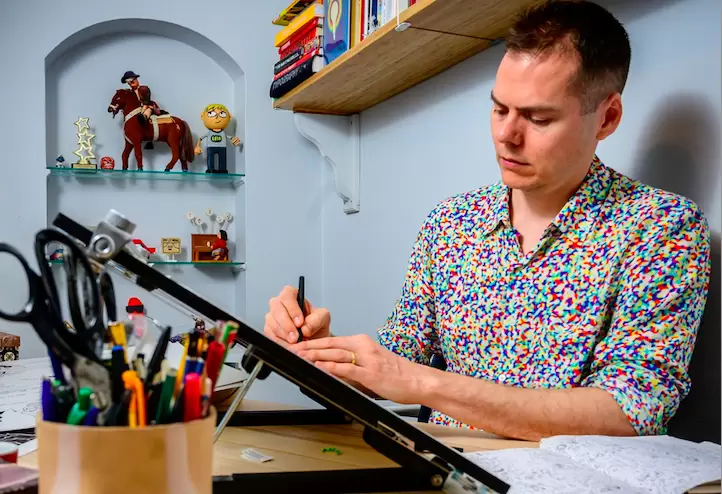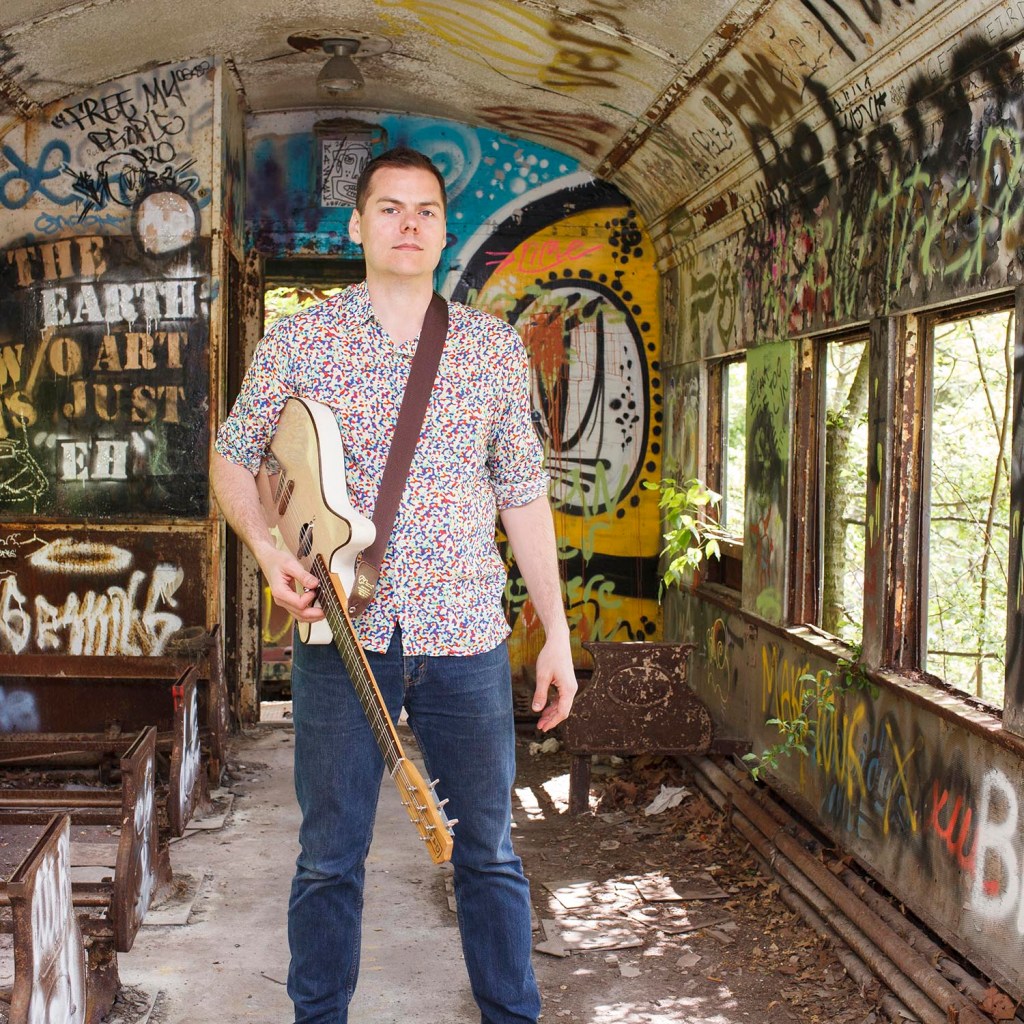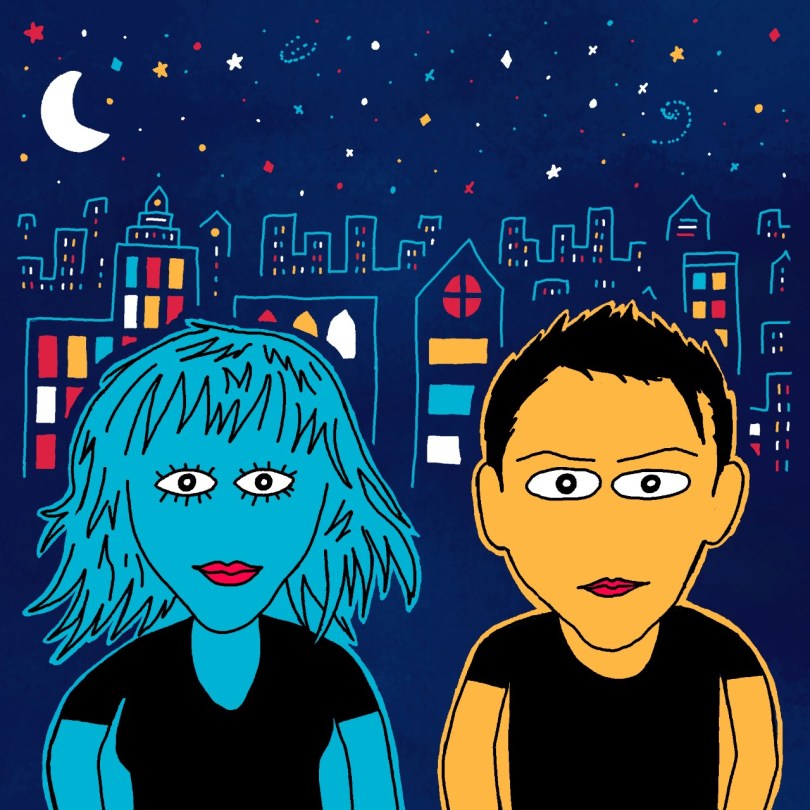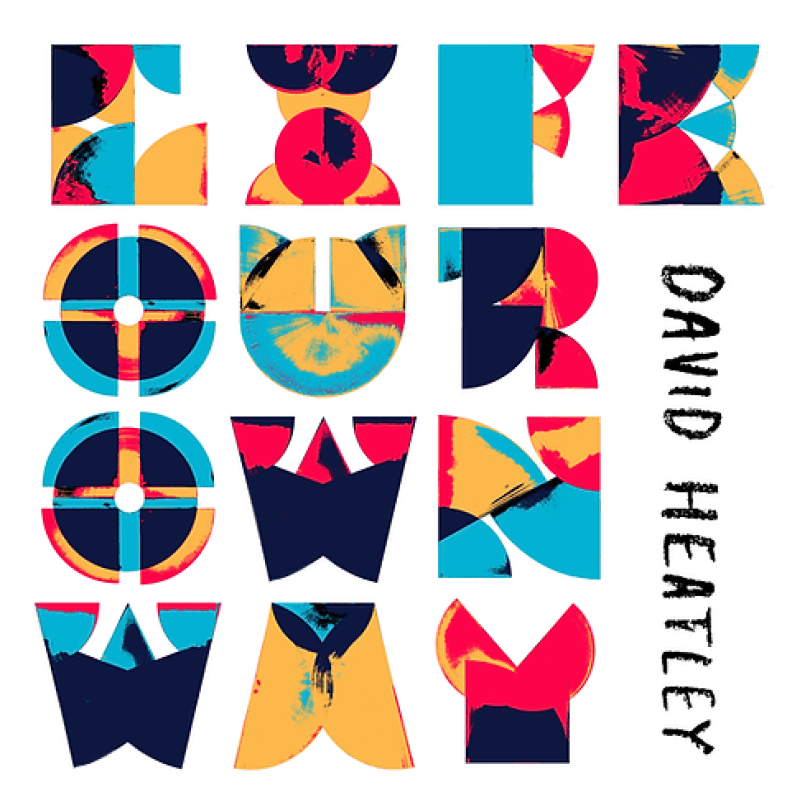

David Heatley, artist, cartoonist, and musician, released his new album, Life Our Own Way, on February 11, 2022. Using music and art to express himself, Life Our Own Way is a powerful album brought to life alongside Mark Bingham in the American South, where his second album is being recorded. This unique album is an experience in which each song is not only its own story, but each has its own genre, so sit back, relax, and enjoy the album after reading this interview with David Heatley.
Anthony:
David, you have quite a storied history with the arts in both audio and visual, so what got you interested in making music?
David:
I credit music with saving my life. I was a pretty depressed teen and if it weren’t for Talking Heads ‘77, They Might Be Giants’ Lincoln, Pixies’ Surfer Rosa, Dead Milkmen’s Big Lizard In My Backyard, De La Soul’s 3 Feet High and Rising, Camper Van Beethoven’s Telephone Free Landslide Victory, and dozens of other albums, I’m not sure what would have happened to me. My Walkman was a protective cocoon and my cassettes were my Prozac. But when I discovered King Missile (Dog Fly Religion), and Dogbowl, both on the Shimmy Disc label, I felt like maybe I could write songs myself. So, my friend Kyle and I started a two-person band called Velvet Cactus Society, modeled after Ween, and started filling up 4-track cassettes with our deranged spoken word stoner poetry.
Anthony:
During your high school days, when you were creating music, what was the point that got you into the visual arts such as drawing, painting, and graphic design?
David:
I’d been drawing since I could hold a pencil and used to make my own little children’s books and comic strips all through grade school. My older brother and I were both into comics and would occasionally draw together but would mostly compete with each other. I learned the power cartons have to skewer and wound your enemies from reading MAD Magazine and I put it to work savaging the popular kids who had all abandoned me in 8th grade. It seemed like the punch landed. They were deeply offended. But it only made them bully me more. By high school, I was drawing and painting in art class with lots of encouragement from my teacher Marnie Ware and I was doing cartoony flyers for my band’s gigs. It was my freshman year at Oberlin when my favorite painting teacher Jacques Wilmore exposed me to painters like Jim Nutt, Alice Neal, Basquiat, and many others that are still my favorites.
Anthony:
At what point did you realize that art was going to be your life and career?
David:
I think it was seeing Chris Ware and Dan Clowes and Julie Doucet’s work that made me aware that comics could be as powerful as any other art form. The 90s were a golden age of “alternative comics” or “literary comics” (or whatever other dumb term people use to describe non-mainstream superhero crap). I wanted to be part of this world and worked my ass off to try to get better and live up to the impossibly high standard being set. I’m still trying to get better and still marvel at their work. There’s plenty further for me to go.
Anthony:
Can you talk about your time as a cartoonist? Your work has been in The New York Times, The New Yorker, among others.
David:
I had a series of lucky breaks in the early 2000s but also put in countless hours, always pushing myself to the limit of my ability and trying to make better work. Chris Ware became a friend and mentor when I lived in Chicago and he’s the one who opened a lot of doors for me, introducing me to editors at several of Chicago’s free weekly newspapers and inviting me to be in the comics issue of McSweeney’s that he edited. I wound up contributing to several other comics anthologies and magazines and self-publishing two issues of my comic book Deadpan. From there, I got the attention of Steve Heller at the New York Times and Francoise Mouly at the New Yorker. I pitched Steve a full-page cover to the special children’s book section of The NYT Book Review, and miraculously, he hired me and ran my page. I sent Francoise a couple of cover sketches and she liked one enough to pay me to finish it, not promising it would run. But it did. Eventually, I got a literary agent. I met Chip Kidd at a party that Chris Ware invited me to - at Francoise and Art Spiegelman’s house. I showed Chip a mock-up of a book I was putting together to collect all my comics up to that point. He invited me to pitch the book to Pantheon and I did. That was my first book My Brain is Hanging Upside Down. At that point, I had met all my idols in comics, including R. Crumb, Clowes, who are both still friends. It took me eleven years to publish my second book with Pantheon, called Qualification. That came out in 2019. I’ve also self-published a few smaller novella-sized books since then. But the long break was mostly because I was shifting gears back to music after a long hiatus.
Anthony:
I also see that you’ve worked with Nickelodeon. Was any of your work what I would’ve seen as a kid in the mid-90s to the early 2000s?
David:
Chris Duffy hired me to draw a cover of “The Comic Book” section of Nickelodeon Magazine. It was an image of a kid, who looked suspiciously like me, having a dream of being naked at school and holding a comic book to cover himself up. I did some other spot illustrations in a few other issues thanks to an art director at the time (now my friend and a super talented illustrator) named Caitlin Keegan.
Anthony:
So, now that’s out of the way, let’s move on to your music. As mentioned above you had a band in high school, how far did that band take you into the music industry?
David:
I wouldn’t say I’ve ever really been near the “music industry,” but my high school band getting to release two albums on our favorite indie record label, Shimmy Disc, really felt like hitting the big time. Our CD was in Tower Records in the Village, which might as well have been getting a billboard in Times Square as far as I was concerned. We mostly played small little clubs downtown and had one performance and an on-air interview on WNYU before we broke up. I know our first CD cracked the CMJ college radio charts. All my other music has been self-released.
Anthony:
What was it like performing with The Bischoffs? That’s a very interesting and unique band.
David:
The Bischoffs consisted of me and three dear friends from high school - Jacob White, Amit Wehle, and Aaron Wolfe. I wrote the songs and we usually sang them with three or four-part harmonies. There were two acoustic guitars, one plugged into distortion pedals played by Aaron. Instead of a drum kit, Amit would bang on a mic’ed school desk. We had a blast at every gig we played. I think our best was a packed Cakeshop show. We brought the house down. Sadly, our live sound didn’t translate well to the studio and after making one fairly overproduced record with all my perfectionistic tendencies in full bloom, we all decided to call it quits. No hard feelings though. I still adore all three of them.
Anthony:
As both an artist and a musician, who are your inspirations?
David:
There are hundreds of musicians I revere, but I guess a few big ones are David Byrne, Jonathan Richman, Frank Black (aka Black Francis), Prince, Caetano Veloso, and Tom Ze. Two close friends are also songwriting influences on me - Pete Galub and Jeffrey Lewis.
Anthony:
Would you say Life Our Own Way is a culmination of your previous EPs or a completely new project?
David:
Completely new. A good deal of these songs were written during the pandemic. Some of them were written after going down to Louisiana for the first time and meeting all the incredible musicians that played with me. In hindsight, I can see how that second wave of songs that made it onto the album was tailored to these specific players.

Anthony:
Let’s talk about Life Our Own Way. This is your first full-length album, correct? Can you take us through how it came to be?
David:
I wrote a fan email to Mark Bingham and gushed about how much I love the records he’s made with Peter Stampfel, especially the recent 100-song collection that came out last year (Peter Stampfel’s 20th Century). I told him I’d been writing a bunch of new songs since the pandemic hit and it was a dream of mine to work with him. To my surprise, he liked a bunch of the demos I’d sent and invited me to come down to his studio and record four of them. We had good working chemistry and the musicians he assembled were such a great fit for my music that I knew I had to immediately go back and do another round. All told, we did fifteen songs together. And about a month after we had finished recording, the record was mixed and mastered. It all went really quickly.
Anthony:
You had quite a few people featured in the album. Expand on the production for us.
David:
That’s all Mark. He’s a brilliant producer and he planned the sessions meticulously. We definitely irritated each other during the mix phase but that’s just because we both cared so much about the record. In the end, Mark is just as much an artist on this album as I am. They’re my songs but filtered through Mark’s vision and sensibility. We’re actually working on my second album now, and I have absolute trust to the point where I’m giving him carte blanche to arrange, and compose parts he hears to fill out the ideas I quickly threw down on my rough demos.
Anthony:
Each song seems to tell its own story. Break down the running order for us.
David:
I don’t set out to write songs across genres but my tastes are very eclectic, and each song that comes to me is its own particular musical microcosm. It used to bother me that I have so many different modes that I write in, but I’m starting to think of it as a strength. There’s a long tradition for that in classic American songwriting, especially within Broadway. Sondheim was a very fluid writer, letting the story within each song dictate its style and rhythm. And I’d say a large part of The Beatles’ genius was how they synthesized and combined so many different genres and made them their own, sometimes switching multiple times within a single song. In terms of track sequencing, it’s more an intuitive thing. You try different track orders ’til it feels right.
Anthony;
What was your time like in the studio recording this album?
David:
It was the most joyful kind of work. I put together this video that captures the behind-the-scenes moments of working on the record, and a friend of mine said the overwhelming feeling they had watching it was love.
Anthony:
Where have been some of your favorite places that your music and art have taken you?
David:
My first book was published overseas, so I was flown to France and Spain to do interviews, and appear at a prestigious festival. That was pretty exhilarating. As far as music, my excitement has always been around recording, so any time I’m in a studio, playing and singing, I feel right where I’m supposed to be. In the case of this record, seeing New Orleans and the swamps of rural Louisiana for the first time, while making a record left an indelible impression. I’m sure I’ll forever associate the two together.
Anthony:
You have a spirit for storytelling, what would you credit for that?
David:
It’s a mysterious thing. My grandfather liked to “hold court” around his dinner and in his heyday could tell joke after joke for hours without repeating himself. But I never really witnessed that. Maybe some of that is in my DNA. I’ve always loved books and TV shows and musicals and have certainly absorbed hundreds of hours of stories that way. And I do enjoy studying storytelling and learning the tricks and structural rules that make things work. I guess on the most profound level, I believe we’re a story-making species and I think the rhythms we respond to, the “beats” as they’re called, are related to the deepest level of our biological functioning. So, when a story feels right, it’s because it’s hitting the parts of our brains that recognize a pattern as “true.” It’s the most satisfying thing in the world to be in the hands of a master who knows how to push all the right buttons at just the right moment.
Anthony:
Some consider you to be an “Anti-Folk.” artist. Would you agree? If so, can you go over what that means to you?
David:
I don’t know that I’d still be considered a part of that world. Jeffrey Lewis is the current reigning figurehead, and his music is a good example of what that label connotes. I’d say there’s a DIY ethos, a focus on being honest and direct, being a bit rude, often funny, and without fussing over the classic “stagecraft” of music production. It’s a bit punk, but not so rigid, or dictatorial about what can, and can’t be done within the genre. Acoustic guitars figure prominently, but not to lull you into a stupor from the prettiness of its sound, like in the 1960/70s version of “folk,” which people now might say was phony. These days, I’m actually more interested in that magic, and stagecraft in making a song. I want to understand and be able to practice the illusion.
Anthony:
Musically, what equipment do you use to play and record with, and does it differ from what you play live?
David:
I haven’t played live in years and I’m not really a gear head. But I like recording with people who are. It’s satisfying to have collaborators who know how to dial in any kind of sound imaginable. I have a quirky 1960s electric guitar called a Danelectro Convertible that has a hollow body, and can be played acoustically with a tinny, banjo-like sound. When I demo songs, I start with that and then layer over cheap keyboards, maybe an acoustic guitar, maybe a plugged-in distorted guitar, and then several layers of vocal harmonies. That’s usually enough to get a rough approximation of the song I’m hearing in my head. Once it goes to the studio and gets produced with other musicians, then the real fun begins.

Anthony:
As far as your visual arts go, can you take us through what mediums you’ve used to create your art through the years? Do you prefer digital or physical drawing?
David:
When I started doing comics in the 90s, I used to paint my comics in gouache, but in the early 2000s switched to drawing the black line art by hand and then coloring it in Photoshop (Chris Ware method). But after a while, I found I was doing so much touch-up on the line art that I might as well be drawing the black lines in Photoshop too. There’s no replacing the feeling of a pen scraping across paper, but my Wacom pen and monitor feel a lot like using a marker on paper, so it’s good for clean line work. I’ll probably keep using paper and ink sometimes, depending on the project.
Anthony:
As an animation director, what have you worked on? Is there anything you’re particularly proud of?
David:
I’ve been directing animated projects for different brands going back to 2004. I recently launched my own production company called Dream Puppy, and have gotten some really cool opportunities, including directing my first broadcast TV spot for Macy’s. This year, I’m shifting into pitching animated TV shows, partnering with a producer called Gaspin Media. We’ve got a show in development that I’m hoping we’ll be able to sell, so I can start playing in that space full-time. That’s the dream.
Anthony:
What would you say your future looks like from here on out, David?
David:
No live shows, but I’m creating multiple animated videos to accompany the record. The title track video “Life Our Own Way” is up on YouTube now. It took four months and 1,000 drawings that I did by hand. The next video should be dropping next month. Stay tuned!
Interested in learning more about the music of David Heatley? Hit the link below:
Be sure to check out the full archives of A.M. Radio, by Anthony Montalbano, here: https://vwmusicrocks.com/a-m-radio-archives/
